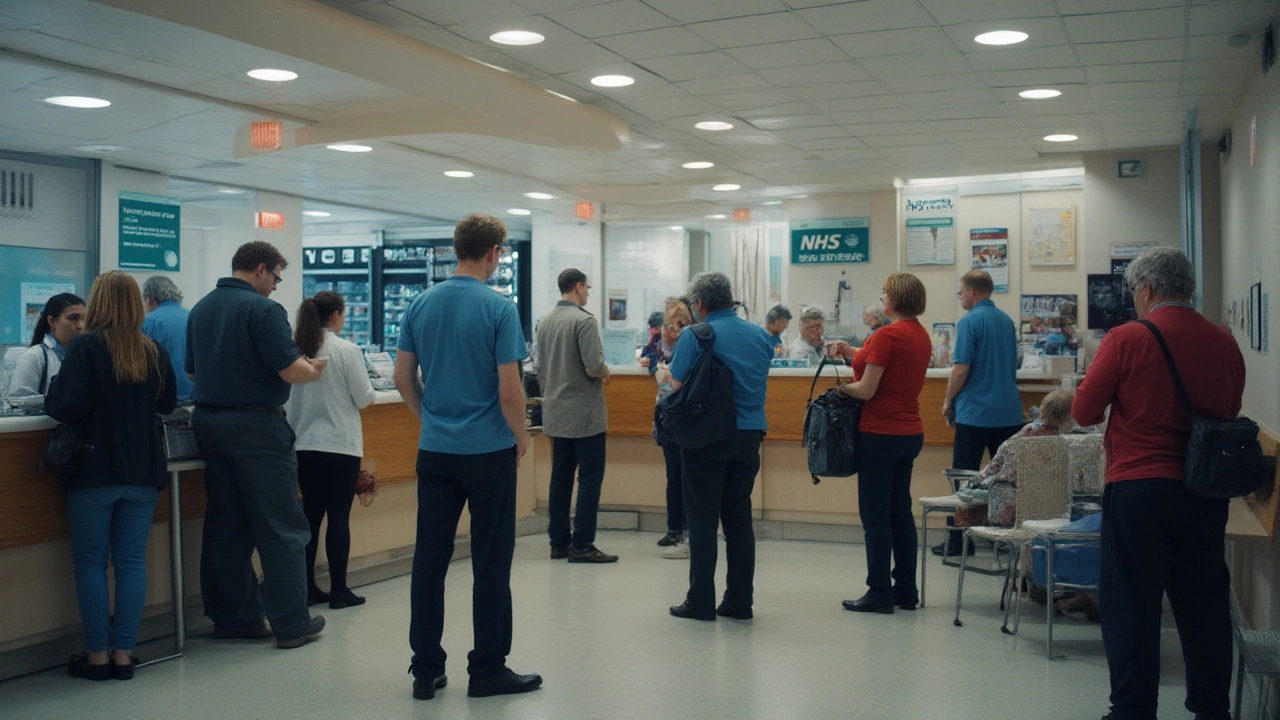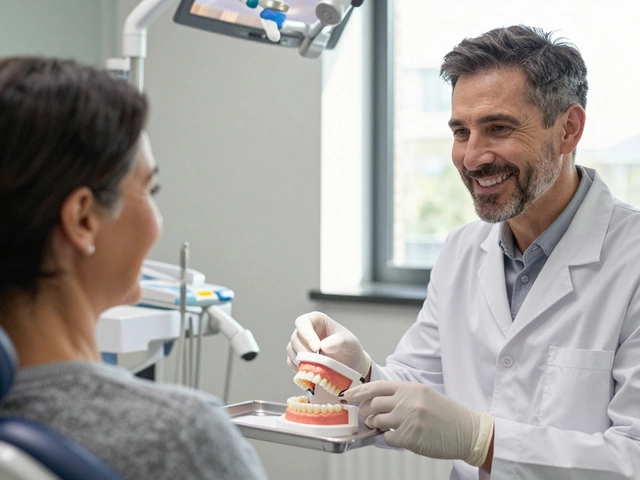If you’ve ever spent time reading UK headlines, you’ve probably seen politicians and campaigners go on about the NHS—Britain’s beloved National Health Service. It’s famous. It’s world-renowned. In some ways, it’s almost a piece of British identity. Ask most Brits what sets their country apart, and free healthcare is likely to come up. But how accurate is it to say healthcare is 100% free in the UK? And what does “free” really mean here, especially compared to the rest of the world? It sounds simple, but once you pull apart the details, it’s way more complicated. So many people move to the UK believing they’ll never see a medical bill, then end up surprised by unexpected costs. If you’re planning to move, study, travel, or just curious how it stacks up to your own country, let’s sort the myths from the realities.
What Does 'Free' Healthcare Actually Mean in the UK?
The phrase “free healthcare” gets thrown around a lot, but in the UK, it’s almost always a shorthand for NHS care. The NHS has been running since 1948, with a simple mission: provide healthcare based on need, not ability to pay. If you’re living in the UK—including citizens, most legal residents, and some international students—most NHS services are funded from tax money. You don’t hand over your credit card to see a GP, and you’re not asked for insurance details in emergencies. Now, this sounds pretty incredible, almost too good to be true, right?
But here’s the catch: "free" doesn’t mean absolutely everything is covered without any hidden costs. Primary medical care—think seeing your family doctor, visiting an emergency room, basic hospital stays, mental health support, and major surgeries—are included. Most maternity care is also covered, including prenatal visits and giving birth. There’s loads of evidence showing the NHS model improves health outcomes and keeps costs per person fairly low compared to countries like the US.
But what about the bits that aren’t covered? That’s where the details matter. Prescriptions, dental care, eye tests, wigs, and some other things usually aren’t 100% free for most people. For example, the NHS prescription charge in England, as of April 2025, is £9.90 per item. In Scotland, Wales, and Northern Ireland, however, you get prescriptions completely free. So even within the UK, access differs. Dental care is another grey area; most adults pay towards dentists visits unless you qualify for exemptions. Eye tests? You’ll usually pay for those too, unless you’re under 16, over 60, or have a specific health condition.
Why these charges? Basically, these add-ons help control costs and stop the system from being overloaded. The NHS tries to balance universal access with making the system financially sustainable. More on these charges below, but the headline here: the most essential care is actually free at the point of use—but not everything is covered. So if your image of the UK is a healthcare utopia where nobody ever pays a penny for anything, you might need a reality check.
Who Qualifies for Free NHS Treatment (and Who Doesn't)?
The list of people who qualify for free NHS care feels simple at first, but there are some real tripwires. UK citizens and most legal residents can use NHS services completely free, including GP visits, hospital stays, and emergency care. If you’re settled in the UK, have Indefinite Leave to Remain, or are a refugee or asylum seeker, you’re sorted. The UK also has reciprocal health agreements with countries like Australia, New Zealand, and a few European nations, which means visitors from those places can sometimes get urgent NHS care without big bills. If you’re an international student in the UK for six months or longer, you’ll likely pay an Immigration Health Surcharge (about £776 per year for adults as of 2025), and this gives you access to the NHS.
But what if you’re just visiting for a holiday, or on a business trip? That’s where things get dicey. Short-term visitors from countries with no reciprocal agreement usually have to pay for most NHS hospital treatment. Emergency treatment in A&E (Accident & Emergency) is free to everyone—even tourists—but staying in hospital, having an operation, or ongoing treatment for conditions like cancer? Not so much. And if you’re from the EU, post-Brexit, things are changing fast. European Health Insurance Cards (EHIC) and the UK’s new Global Health Insurance Card (GHIC) do grant access to some healthcare, but it’s not always full access. Long story short, you can still end up stuck with a bill if you need hospital care and aren’t covered.
It gets even more confusing in places like Northern Ireland, Scotland, and Wales. The NHS is devolved, so rules differ slightly. For example, Scotland and Wales have free prescriptions for everyone, while England charges per item. Some areas offer more generous support for dental and eye care than others.
There are still loads of ways you might qualify for more comprehensive free care. If you’re low income, pregnant, a child, or an elderly person, you can often get help with prescription and dental charges through the NHS Low Income Scheme. War veterans and people with certain chronic conditions also get extra support; check the official NHS website for specifics. But there are always catches and loopholes, so it pays to read the fine print.
It’s wild how different things look when you’re a student, temp worker, or just a long-term traveler. And don’t forget—certain types of treatment, like cosmetic surgery (unless it’s medically necessary), fertility treatment, and travel vaccinations, are almost never free. Some people buy private health insurance or use private hospitals on top of the NHS. This is especially common for speedy diagnostics or elective surgeries you don’t want to wait for. According to a 2024 report by The King’s Fund, about 13% of Britons now have some form of private health cover, although most still rely on the NHS for critical care.

Hidden Costs: What the NHS Doesn't Cover
You’d be surprised how many people think the NHS covers everything—and get a nasty shock when the first dental bill or eye exam charge lands in their lap. Don’t want to get caught out? Here’s the real deal. NHS healthcare covers core medical needs: A&E visits, hospital care, seeing your GP, basic mental health services, maternity, and even cancer treatments. But anything a little outside that, the bill’s on you unless you qualify for exemption.
Prescription fees are probably the biggest hidden cost. Most adults in England pay a flat rate per item—£9.90 as of April 2025. Chronic illness or lots of medications? The costs add up fast. Scotland, Wales, and Northern Ireland cover these, so if you move UK countries, check the rules. There’s also the NHS Prescription Prepayment Certificate, a sort of “season ticket” for meds. Pay up-front for three or twelve months, and you’re covered for as many scripts as you need. For someone with regular prescriptions, that’s a serious money-saver.
Dental care is a whole other pain point. Sure, kids and certain groups get free care. But for most working-age adults, even an NHS dentist will charge. As of 2025, Band 1 treatment—an exam, diagnosis, X-rays—costs about £26.80; Band 2 (fillings, extractions) is £73.50; and Band 3 (crowns, dentures) shoots up to £319.10 in England. Scotland and Wales set their own prices, sometimes a bit cheaper. Private dentists? That’s a different universe—and a much bigger bill. Routine eye tests are usually only free for children, people over 60, and folks with specific eye conditions. Otherwise, you’ll pay between £20-£30 for an exam, plus whatever glasses or lenses you need.
There are stranger exclusions too. Most travel vaccinations, like for yellow fever or rabies, aren’t on the NHS. Cosmetic surgery only gets covered if there’s a big medical reason. Fertility treatments are a postcode lottery—some NHS areas are generous, others barely offer one round of IVF. Hearing aids and wigs are sometimes free, sometimes not. It’s down to local rules and needs. And the NHS won’t pick up the tab for private healthcare or alternative therapies, unless a doctor says it’s essential and you meet the strict criteria.
Parking at hospitals is often not free (except in Scotland and Wales), which is a notorious bugbear for patients and visitors. For long-term conditions, transport to hospital appointments might be free, but again—big print gives, small print takes away. Always check if you’re eligible.
As a patient, this means you’ve got to be savvy. Look into NHS exemptions before you need them. If you earn a low income or get certain government benefits, you might qualify to have costs waived. Students, pregnant people, children, and pensioners have the best luck. NHS dental clinics can sometimes be hard to find, with long waiting lists, so many people go private out of necessity, not luxury.
One of the biggest surprises for non-UK residents is that ambulance rides, while urgent and essential, aren’t always free if you’re not eligible for NHS care, so travel insurance really matters. And even for residents, going private skips the NHS queue but sends the costs to you or your insurer.
Tips for Navigating the UK Healthcare Maze
Knowing what you’re covered for is half the battle when you move or travel to the UK. Here’s how to dodge the worst surprises and make the most out of NHS access.
- Check your eligibility: If you’re coming to the UK for work, study, family, or as a refugee, confirm you’re registered with a GP (General Practitioner) and understand if you need to pay the Immigration Health Surcharge. This is your ticket to NHS access, so sort it before arrival. If you’re a tourist from a country with a reciprocal agreement, bring documentation with you.
- Find your NHS number: Registration is free and quick, and you’ll get a unique NHS number which you’ll need for almost every appointment or hospital trip.
- Know the charges: Use the NHS’s own calculators online to work out your likely prescription, dental, or optical costs. If you take meds regularly, get a Prescription Prepayment Certificate—it’s good value if you need more than three scripts every three months.
- Seek exemptions: Students, pregnant people, kids, pensioners, or those on a low income can apply for help with health costs. Don’t assume you aren’t eligible—a lot of people miss out because they never check.
- Plan for exclusion zones: Want cosmetic surgery, fertility treatment, or travel vaccines? Assume you’ll pay unless your doctor says it’s medically urgent—and even then, double-check.
- Private care as a backup: For faster access or things not covered by the NHS (like some physio, dental, or elective surgery), having a private plan can speed up the process, but it’s not required for emergencies or basic care.
- Travel insurance: Always get comprehensive insurance before visiting the UK, even if you qualify for basic NHS care as a tourist. This can cover ambulance trips, emergency repatriation, and anything the NHS doesn’t handle for foreigners.
If you want the deep-dive, one of the most useful resources is the official NHS website. It breaks down local rules, eligibility, and any changes due to Brexit, the cost-of-living crisis, or NHS funding tweaks. The British Medical Association regularly releases real-world reports—according to their latest guidance, "while free at the point of access remains the golden standard, out-of-pocket costs are rising for typical families."
“The NHS is the closest thing the English have to a religion,” said Nigel Lawson, former Chancellor of the Exchequer, reminding everyone just how important, cherished, and deeply embedded this system is in daily life, for all its flaws and complexity.
The myth of totally free UK healthcare is partly true, but every system has its limits. Knowing where your blind spots are—and how to keep them covered—can save you a lot of shock, and maybe quite a lot of money, too. Wherever you’re from, healthcare is always a patchwork. In the UK, the NHS covers the basics for almost everyone, and compared to many countries, that’s pretty incredible.





